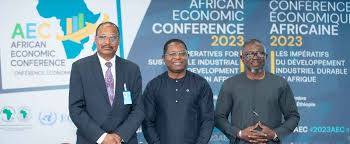**Why Africa’s Future Depends on How Fast It Attains Modern Skills for Development**
Africa, a continent rich in natural resources and cultural diversity, stands at a pivotal moment in its development journey. While its youthful population is often cited as its greatest asset, the continent’s future largely depends on how swiftly and effectively it equips its people with modern skills. As the world transitions into a knowledge-based economy, Africa’s ability to develop a skilled workforce is critical to its long-term growth and prosperity.
### **The Importance of Modern Skills**
Modern skills encompass competencies required in today’s rapidly evolving industries, such as technology, renewable energy, healthcare, finance, and manufacturing. These skills are vital for innovation, productivity, and competitiveness in a globalized economy. For Africa, the urgency to attain such skills is heightened by several factors, including rapid population growth, rising unemployment, and the digital revolution.
By 2050, Africa’s population is expected to double, reaching approximately 2.5 billion people. More than 60% of this population will be under the age of 25, making it the youngest continent in the world. This demographic advantage, often referred to as a “youth bulge,†can either be a blessing or a curse. Without access to education and modern skills, the continent risks a surge in unemployment, social unrest, and economic stagnation.
### **Challenges to Skill Development in Africa**
1. **Education Gaps**
Africa’s education systems face significant challenges, including inadequate infrastructure, limited access to quality education, and outdated curricula. Many schools still focus on traditional rote learning, which does not prepare students for the demands of a modern workforce.
According to UNESCO, over 30 million children in sub-Saharan Africa are out of school, and many who do attend school fail to acquire basic literacy and numeracy skills. This education gap hampers the continent’s ability to develop a skilled labor force.
2. **Digital Divide**
While technology is transforming industries globally, many African countries lag in digital adoption. Limited access to affordable internet and digital devices restricts opportunities for millions of young people to learn critical tech-based skills such as coding, data analysis, and digital marketing.
3. **Mismatch Between Skills and Job Market Demands**
A significant challenge in Africa is the disconnect between education systems and labor market needs. Many graduates possess qualifications that are irrelevant to industry requirements, leading to a high rate of educated unemployment. Bridging this gap requires close collaboration between governments, educational institutions, and the private sector.
4. **Gender Inequality**
Women and girls in Africa face systemic barriers to education and skills training. Cultural norms, early marriages, and limited access to STEM (Science, Technology, Engineering, and Mathematics) education exacerbate gender disparities, leaving half of the population underrepresented in critical sectors.
### **Opportunities for Skill Development**
Despite these challenges, Africa has immense potential to leapfrog into a prosperous future through skill development. Here are some key strategies to accelerate this process:
1. **Leveraging Technology**
Technology offers a unique opportunity to democratize access to education and skills training. E-learning platforms, mobile apps, and virtual reality can provide affordable and scalable solutions for teaching modern skills. Initiatives like Africa Code Week and Andela are already equipping thousands of young Africans with coding and software development skills.
2. **Public-Private Partnerships**
Governments alone cannot address the skills gap. Collaboration with the private sector is essential to align education with industry needs. Companies can offer internships, apprenticeships, and on-the-job training programs to prepare students for real-world challenges.
3. **STEM Education and Innovation Hubs**
Investing in STEM education is crucial for Africa’s industrialization and technological advancement. Innovation hubs and tech incubators, such as Kenya’s iHub and Nigeria’s Co-Creation Hub, are fostering a culture of entrepreneurship and innovation among young people.
4. **Empowering Women and Girls**
Closing the gender gap in education and skill development is not only a moral imperative but also an economic one. Studies show that gender diversity enhances productivity and innovation. Programs like the African Girls Can Code Initiative are helping to bridge this gap by encouraging girls to pursue careers in technology.
5. **Upskilling and Lifelong Learning**
As industries evolve, continuous learning is essential to keep up with changing demands. Governments and businesses must invest in upskilling programs to enable workers to transition into emerging sectors, such as renewable energy and artificial intelligence.
### **The Role of Governments and Regional Collaboration**
African governments have a crucial role to play in creating an enabling environment for skill development. This includes investing in education infrastructure, reforming curricula, and promoting policies that encourage innovation and entrepreneurship.
Regional collaboration is also essential to share best practices and resources. Initiatives like the African Continental Free Trade Area (AfCFTA) can facilitate cross-border partnerships, enabling countries to pool resources for skill development programs.
### **The Consequences of Inaction**
Failing to address the skills gap could have dire consequences for Africa. Unemployment and underemployment would rise, fueling poverty, inequality, and social unrest. Additionally, the continent would miss out on opportunities to participate in the global economy, remaining a consumer rather than a producer of technology and innovation.
### **Conclusion**
Africa’s future depends on its ability to equip its people with modern skills for development. By prioritizing education, embracing technology, and fostering partnerships, the continent can transform its challenges into opportunities. With a young and dynamic population, Africa has the potential to become a global powerhouse, driving innovation and sustainable growth.
The urgency to act cannot be overstated. The speed at which Africa attains modern skills will determine whether its youth become the architects of a thriving future or the victims of missed opportunities. Investing in skills today is investing in the continent’s tomorrow.




No comments yet
Be the first to share your thoughts!